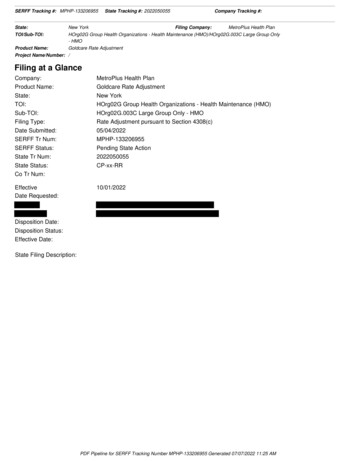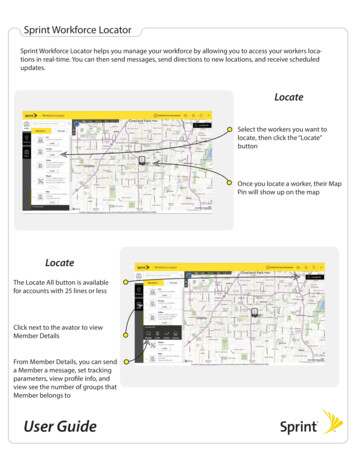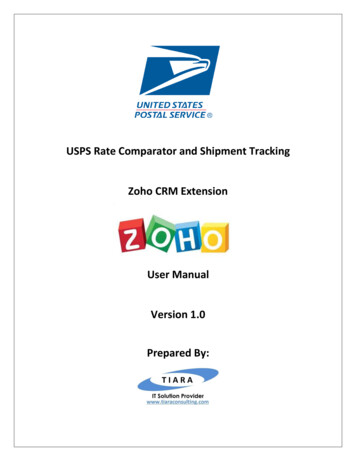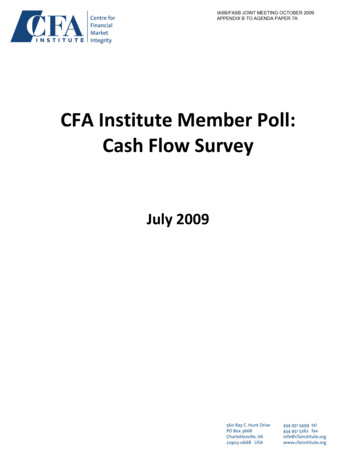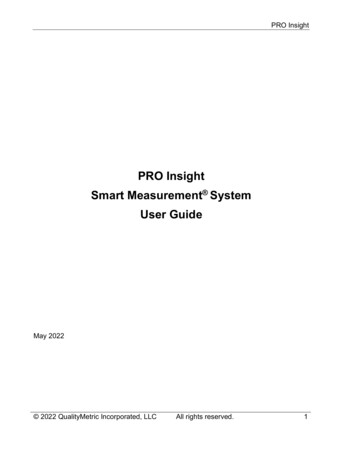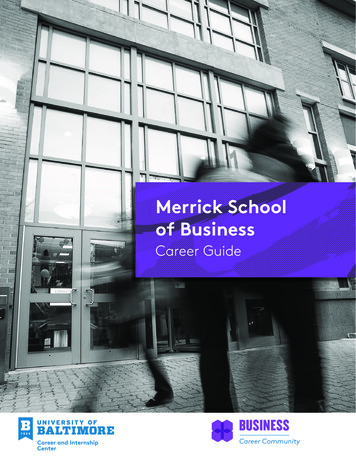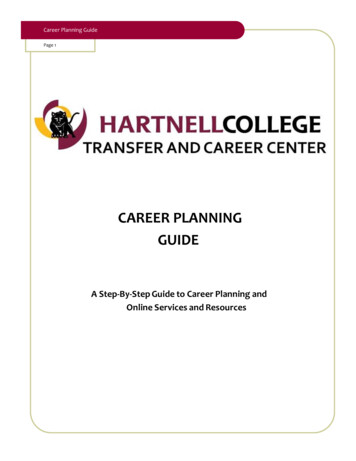Transcription
2017 Career Tracking Surveyof Doctorate HoldersProject Report
European Science Foundation (ESF)Over four decades of setting science agendasfor EuropeBased in Strasbourg, France, ESF was established in1974 as an independent, non-governmental, non-profit organisation to provide a common platform for itsMember Organisations to collaborate internationally onresearch programmes through its networking, fundingand coordination activities. The launch of ScienceConnect, our new expert services division, marks thenext phase of ESF’s role, borne out of our deep understanding of the science landscape, funding contextand needs of the research community at this criticaljuncture.www.esf.orgCareer Tracking Project TeamJulia BomanScience OfficerCoordinator and AuthorJulija BaginskaiteJunior Science OfficerData managementTiphaine SturtzAdministrative AssistantBack-office supportEmily De Young BeckerAdministratorProof-reading and editingScience ConnectYour partner in ScienceExternal ExpertsScience Connect’s mission is to partner with clients inleading successful projects and in facilitating informeddecision-making through a broad range of science-support services including Peer Review, Evaluation, CareerTracking, Programme and Project Management andAdministration, the hosting of Expert Boards and VirtualInstitutes. Building on ESF’s extensive network andexperience, Science Connect delivers resources, toolsand metrics to support the effective administration ofscience projects in both the private and public researchsector.Researcher, University of LjubljanaMethodology Expert and AuthorOur core values Integrity in our approach Partnership in all our activities Transparency of our processes Excellence in science management Evidence-based decision-makingDr Barbara BreckoDr Nejc BerzelakResearcher, University of LjubljanaMethodology Expert and Author
Table of Contents1Introduction 153Methodology 202Project partners 173.13.23.33.43.5Target population and sampling20Questionnaire development 20Data collection and survey participation21Data protection arrangements23Notes on analyses and the survey dataset 233.5.1 Questions not answered by all respondents 243.5.2 Specific cases and questions excluded from analyses 243.5.3 Derived and recoded variables in the dataset244.Results 254.1 Profile of doctorate holders 254.2 Doctorate training and transition to first position4.2.14.2.24.2.34.2.44.2.527Doctorate completion time27Competences 30Job search33Post doctorate positions 34Experience with the transition from the doctorateto the first position and added value of the doctorate 354.3 Employment situation 364.3.1 Employment status364.3.2 Sector of employment 404.3.3 Relation of employment with doctoral degree424.3.4 Level of qualification434.3.5 Engagement in research 444.3.6 Researchers: activities, outputs and motivation464.3.7 Motivation for taking the current job: researchers and non-researchers 494.3.8 Satisfaction with current working environment504.3.9 Changing career544.3.10 Staff management responsibilities564.3.11 Career break 574.4 Mobility4.4.14.4.24.4.34.4.458Mobility after completion of the doctorate 58Reasons for moving to another country61Transnational collaboration61Cross-sectoral collaboration63
5.Discussion and Conclusions 655.1 Employment situation 655.2 Employment sector 665.3 Doctorate holders in Humanities 665.4 Employement relationship with doctoral degree and level of qualification675.5 Job satisfaction and plans for career change685.6 Doctorate completion time and type of doctoral training685.7 Transition to first job695.8 Doctoral training and skills 695.9 Career orientation and support for job search705.10 Mobility 715.11 Gender aspects 715.12 Methodological approach72Annex: Summary statistics of survey questions1.2.3.4.5.74Doctorate education74Transition from doctorate to the first position 80Employment situation and career related experience82Mobility on Annex 98Demographic details 102
Index of FiguresFigure 1: Doctorate training programme type 26Figure 2: Respondents by doctorate field26Figure 3: Doctorate field by gender27Figure 4: Average completion time by doctorate field (years)28Figure 5: Years between admission and thesis defense by doctorate field28Figure 6: Doctorate completion time by age of the respondent29Figure 7: Years between admission and thesis defense, by doctorate training programme type29Figure 8: A comparison of the self-reported level of competences at the timeof the doctorate completion and their importance in the current job31Figure 9: A comparison of the self-reported level of competences at the time of the doctoratecompletion and their importance in the current job according to sector of employment32Figure 10: Importance of different resources when looking for a first jobafter the completion of the doctorate34Figure 11: Importance of reasons for taking a post doctorate position35Figure 12: The average rated benefits of doctorate degree for career development35Figure 13: The average rated benefits of doctorate degree for careerdevelopment among researchers and non-researchers36Figure 14: Current employment status36Figure 15: Employment status according to the number of years since doctorate completion37Figure 16: Employment status according to doctorate field38Figure 17: Employment status of respondents employed at universitiesby the number of years since doctorate completion40Figure 18: Sector of employment by gender41Figure 19: Sector of employment by doctorate field42Figure 20: The relationship between work and doctorate by sector of employment43Figure 21: Minimum education requirement for current job by sector of employment44Figure 22: Share of researchers and non-researchers45Figure 23: Engagement in research in current job by doctorate field46Figure 24: Researcher career stage (level per European Framework for Research Careers)46Figure 25: Researcher position: men vs. women47Figure 26: Researchers’ activities at current job47Figure 27: Researchers’ outputs in the last 12 months49Figure 28: Researchers’ outputs: men vs. women49Figure 29: Reasons for taking current job: researchers50Figure 30: Reasons for taking non-research job50Figure 31: Job satisfaction: men vs. women52Figure 32: Job satisfaction: researchers vs. non-researchers52Figure 33: Job satisfaction: researchers on permanent and temporary contracts53Figure 34: Plans to change career in the next three years by engagement in research54Figure 35: Plans to change career in next three years by sector of employment55Figure 36: Plans to change career in next three years by doctorate field56Figure 37: Staff management responsibilities by the number of years since doctorate completion56Figure 38: Employed respondents who took career break since doctorate completion57Figure 39: Reasons for taking career break57Figure 40: Mobility by sector of employment59Figure 41: Mobility by doctorate field60Figure 42: Reasons for moving to another country61Figure 43: Involvement in transnational collaboration in last 12 months by sector of employment61Figure 44: Types of transnational collaboration62Figure 45: Types of transnational collaboration by employment sector62Figure 46: Level of cross-sectoral collaboration by sector of employment63Figure 47: Cross-sectoral collaboration by doctorate field64
Index of TablesTable 1: Participating institutionsTable 2: Demographic profile of respondentsTable 3: Employment status according to sector of employmentTable 4: Engagement in research in current job by sector of employmentTable 5: Researchers’ activities according to sector of employmentTable 6: Satisfaction with current working environment: researchersTable 7: Work satisfaction according to sector of employmentTable 8: Ease of return to previous or new position after career breakTable 9: Profile of the geographically mobile doctorate holderTable 10: Number of foreign countries lived in for more than three months22253945485154585960
AcknowledgementsAbove all, we would like to express ourappreciation and gratitude to over 2000 doctorateholders who took part in this survey, and we hopethat the resulting report reflects their contributions.Finally, we would also like to thank our ESFcolleagues who assisted the project in a numberof ways, either by testing and commenting on thequestionnaire, providing helpful comments andsuggestions for the final report, or assisting withcommunications: Sigolène Côte-Rey, Dr IldikoIpoly, Eliana Legoux, Emily DeYoung Becker, DrEmmanouil Detsis, Dr Ana Maria Ciubotaru, DrAna Helman, Dr Patricia Cabezas, and Dr JeanClaude Worms.Julia BomanScience Officer,Coordinator of the project7Career tracking of doctorate holdersThis career tracking survey could not havebeen accomplished without the financial supportof the participating organisations, and active andenthusiastic involvement and support of theirproject representatives: Dr Michael Klimke, DrSarah Kersten, Laura Oster and Dr Benjamin Brastat the Technical University of Munich, Germany;Dr Hans Ouwersloot at Maastricht University, TheNetherlands; Dr Sybille Küster and Anja Schenkat Goethe Graduate Academy, Goethe UniversityFrankfurt, Germany; Professor Damir Sapunar atthe University of Split, Croatia, Cassandra Mikicicat the University of Luxembourg; Dr Andreas Bladtand Dr Anke Zwetsch at the Luxembourg Instituteof Science and Technology; Professor BogdanMurgescu, Dr Stefania Matei and Dr CorinaBragaru at the University of Bucharest, Romania;Dr Saltanat Schweitzer at the Institute of Scienceand Technology Austria; and Julien Desfloquet atthe AXA Research Fund, France. We hope that thecollected data and analyses will be helpful in thequality assurance processes and strategy buildingfor doctoral education at these organisations andbeyond.We also would like to thank our experts, DrBarbara Brecko and Dr Nejc Berzelak, University ofLjubljana, for their tireless involvement in the project,advice on the methodological issues for surveydesign and implementation, as well as data analysis.We would like to extend our thanks to ProfessorMaresi Nerad, Center for Innovation and Researchin Graduate Education (CIRGE), University ofWashington, Seattle, USA for reviewing the draftquestionnaire and providing useful comments andsuggestions in the early stages of the project.
ForewordCareer tracking of doctorate holders8In 2015 the European Science Foundation (ESF)published the report from its first career trackingpilot study. Comprising data from the doctorateholders surveyed and supported by five participatingorganisations, it tested the survey instrument andpresented a number of findings. While these couldnot be extrapolated to the broader population of PhDholders, given the very small sample being surveyed,some interesting results were obtained, including theobserved difference in performance and satisfactionlevels between those with employment continuityand those with temporary contracts, within thesample of mainly academia-based post-doctorateresearchers.The current survey, supported by nineparticipating organisations, was launched in2016 and significantly redeveloped the surveyinstrument to reflect a broader doctorate holderpopulation under study, working in academia butalso business, government or other sectors. We arepleased to present the findings of this survey in thisreport. It offers a wealth of data on the employmentsituation, and transition to the labour market, of thedoctorate holders under study. It is gratifying thatemployment levels are found to be high and the vastmajority deploy their skills as researchers. However,the study pointed to what seems to be a persistingstructural problem in universities (the most popularjob destination), where the number of permanentlyemployed doctorate holders is much lower than inother sectors.Another important finding is that while doctorateholders experience a rather smooth transition to thelabour market, and see their doctorate as an addedvalue, those who sought non-academic careers feltsomewhat less prepared. In the wider Europeancontext, where Europe is struggling to increase itsshare of researchers in the business enterprise sectorto the level of its competitors in US and Japan, thisis to be taken seriously. It points to a need for greaterpreparation, either during the formation phaseor through continuing professional development.We hope that these findings will be of use to thepartner organisations, as they offer food for thoughtas regards the development of transferable skillstraining, career advice and orientation.One of the most important conclusions isthat the study demonstrated again the feasibilityand appropriateness of the selected approach andinstrument to study careers of diverse groupsof doctorate holders. There is a clear benefit tocontinuing, and scaling up, this study in the futureto enable better opportunities for participatingorganisations, as it offers reliable data, representativeof the participating organisations, and the possibilityof creating a central statistical database that canbe used as benchmark for analysis at the level ofindividual organisations, universities or otherwise.
Clearly, European universities, decision-makersand science stakeholders do require this sort of careertracking instrument, and regular representative data.ESF intends to do its part in the development andsetting up of such a platform in order to providedecision-makers, and those who devise fundingsupport, with a better evidence base and bettermetrics in terms of research careers.We would like to express our gratitude to thenine organisations that supported this secondcareer-tracking project, not only for their financialcontribution, but for their active shaping of thesurvey design.Martin HynesESF PresidentJean-Claude WormsESF Chief Executive9Career tracking of doctorate holdersThe question of the granularity of such a careertracking database or platform needs, of course,further discussions and refining. For instance,should the surveys and analyses be done at countryor regional level? How can we involve sciencestakeholders in a meaningful way in the definitionof the survey questions? How frequently should thesurvey be repeated in order to support decisionmakers effectively, while avoiding “interviewees’fatigue”?
Executive summaryCareer tracking of doctorate holders10IntroductionUniversities, non-university-based researchperforming organisations and research fundingorganisations all want to better document the careertrajectories of doctorate holders in order to assess theimpact of investment in research career development,and to analyse practices aimed at the development ofresearch careers, thereby providing decision-makersand science stakeholders with a better evidence baseand metrics in terms of research careers.This career tracking study of doctorate holdersbuilds on the work of the ESF Member OrganisationForum ‘European Alliance on Research CareerDevelopment’ (EARCD), and specifically its reportDeveloping Research Careers In and Beyond Europe(2012)1, which articulated a need for career trackingsurveys across research institutions in Europe. Italso builds on its Working Group report How toTrack Researchers’ Careers (2012)2 and an ESF pilotstudy Career tracking of Doctorate Holders (2014)3completed in 2015.The aims of this career tracking survey were to: Build on the ESF pilot study and furtherdevelop an online post-doctoral career progressionand outcome instrument for monitoring, evaluationand planning purposes; Understand where doctorate holders in theparticipating organisations moved in their careers(research vs. non-research careers); Help understand occupational patterns ofresearchers, not only in academia but also industry,education, health and public administration; Contribute to evidence-building regarding thechallenges, bottlenecks and opportunities that arisefor people pursuing research careers; Help universities and non-university research123performing organisations to better tailor theirdoctoral education and career advice to meetresearchers’ needs; Explore whether doctoral training enabledrespondents are able to progress towards their desiredcareer goals within or outside academia; Collect evidence that helps funding organisationsto evaluate the wider impact and benefit of schemessupporting research career development.Project PartnersESF-SCIENCE CONNECT launched a callfor interested research performing and fundingorganisations to join a career tracking survey inApril 2016. Nine organisations joined the project:University of Maastricht, The Netherlands; TechnicalUniversity of Munich, Germany; Goethe ResearchAcademy for Early Career Researchers (GRADE) atGoethe University Frankfurt, Germany; Universityof Bucharest, Romania; University of Split, Croatia;University of Luxembourg, Luxembourg; Instituteof Science and Technology, Austria; and the AXAResearch Fund, France.MethodologyThe target population of the 2017 Joint CareerTracking Survey of Doctorate Holders were doctorateholders who obtained their degree in the last sevenyears, that is, over the period between 2010 and2016. Each partner organisation enumerated thedoctorate holders over this period and established alist of individuals eligible to participate in the survey.In all but one case, partner organisations wereable to provide ESF-SCIENCE CONNECT withthe list of available up-to-date contact details of theirPhD holders/graduates (name, email and year ofgraduation). Where this was not possible due to dataEuropean Science Foundation, Developing Research Careers In and Beyond Europe: Enabling – Observing – Guiding and Going Global,a report by the ESF Member Organisation Forum ‘European Alliance on Research Career Development’ (EARCD), 2012.European Science Foundation, How to Track Researchers’ Careers, a report by the ESF Member Organisation Forum ‘European Alliance forResearch Careers Development’ (EARCD), 2012.European Science Foundation, Career Tracking of Doctorate Holders: Pilot Project Report, 2014.
The basis for the survey was the pilotquestionnaire used in the ESF pilot study, which wasfurther developed by ESF-SCIENCE CONNECTand partner organisations. The questionnaire wasin English and included five sections: 1) doctorateeducation, 2) transition from doctorate to the firstposition, 3) employment situation and related careerexperience, 4) physical, virtual and intersectoralmobility and 5) demographics. Items of interest tothe participating organisations were also designedupon request, and were included as additional andoptional organisation-specific modules.In addition to ESF-SCIENCE CONNECTexperts Dr Nejc Berzelak and Dr BarbaraBrečko from the University of Ljubljana, the draftquestionnaire was reviewed by Professor MaresiNerad from the Center for Innovation and Researchin Graduate Education (CIRGE) at the Universityof Washington, Seattle, US, who provided a numberof suggestions on the contents of the questionnaire.The survey was launched on 14 March 2017,and data collection was carried out for the periodof four weeks. The survey collected 2046 completeresponses, which represents 23 % of all those whoreceived the survey invitation. Over 90 % of allthose who started filling out the survey reached theend of the questionnaire.Main outcomes and conclusionsDoctorate holders demonstrate high ratesof employment, with a majority working onpermanent contracts and an even larger proportion working as researchersDespite the voiced concerns in the media andacademic press about the overproduction of PhDgraduates over the past decades, our findings reporta very high employment rate of the studied cohort,with 95 % being employed. Among these employedrespondents, a vast majority (80%) are working asresearchers. The overall unemployment rate is 4 %and diminishes over time, reaching 2 % for thosewho received their degree six to seven years ago.Doctorate holders in humanities have however asignificantly higher level of unemployment (9 %)which is more than two times higher than forother research domains, including social sciences(4 %). High unemployment among the humanitiesdoctorate holders is an alarming result and it isimportant to understand why these doctorateholders in our sample seem to have a harder timethan others finding employment.Only slightly over half of those in the academic sector are employed on permanent contracts, compared to the vast majority of thosein other sectorsWhen looking at the different sectors, onenotices a major difference between academic andnon-academic sectors in terms of permanentemployment, which indicates a persistent structuralproblem of saturation within academia, criticised bya large body of literature in Europe and the US. Wehave seen that about one third of all researchers inour sample are currently employed in post-doctoratepositions, and over 40 % in other positions (e.g.research fellow, senior researcher, Assistant Professor,Associate Professor, Professor, etc.) While one mayargue that temporary post doctorates are beneficialin the sense that they incentivise researchers to moveout of their home institutions and gain valuableexperience elsewhere, the paucity of permanentcontracts at universities in later career stages is moreworrying.Universities and the academic sector are themain destination for early-career doctorateholders, although the presence of doctorateholders in industry, government and othersectors is also not negligibleDespite the lack of permanent academic positions,62 % of respondents are currently working in theacademic sector (universities and RPOs and RTOs),and 40 % in non-academic sectors. It is important tokeep in mind that the studied cohort are early careergraduates and mostly from research universities,and this may be reflected in the seemingly highshare of university-based employment, comparedto countries like Germany, Luxembourg, or theEU average. With the progression of careers andthe corresponding search for employment stability,many may leave academia for other sectors. One canassume that with the lack of permanent jobs withinacademia, and seemingly more secure job prospectsin the private sector or government, the latter sectorswould become increasingly attractive destinations in11Career tracking of doctorate holdersprotection requirements, the partner organisationsent the survey link and all communication directlyto their graduates, in close coordination with ESFSCIENCE CONNECT office.
the future for other fields as well.Most doctorate holders work in jobs that areat least partly related to their doctorateCareer tracking of doctorate holders12It is in the academic sector that respondentswork in jobs most closely related to their PhD; still,a vast majority of respondents working in othersectors such as industry, government or hospitalshave jobs that are at least partly related to theirPhD. Therefore, it would appear that, even whennot engaged in research, most doctorate holders stillfind jobs related to their study and are able to offerskills other than those related to research at theirworkplace.A doctorate is most needed for jobs in theacademic sector and to a lesser extent, inindustry, while a Master’s is the most widelyrequired qualification in other sectorsThe findings for our sample also demonstratethat, while the vast majority of jobs of respondentsworking in universities and RPOs/RTOs required adoctorate, or even a post-doctorate, a master’s-leveldegree was by far the most required degree for thoseworking in government, services or hospital (5074 %). In industry, equally large shares (45 % each)of respondents worked in positions that requireda doctorate or a master’s-level degree. There is anemerging literature looking at the possible effectof over-education of doctorate holders, and theirpossible misallocation in the labour market, whichcan bear a significant societal and individual cost –especially considering the length of, and the highpublic and individual investment, into, doctorateeducation. However, educational mismatch alonemay not necessarily mean that doctorate holdersare working in jobs that do not sufficiently utilisetheir capacities and knowledge. It is importantto see whether the educational mismatch is alsoaccompanied by a mismatch in the skills usage aswell as low levels of satisfaction with the salary andother aspects of the job.Doctorate holders are mostly satisfied withtheir jobs, with researchers being more satisfied with the intellectual challenge of theirposition than non-researchers, but less sowith job security, salary and work/life balanceWhen looking at satisfaction levels across thedifferent employment sectors, it is encouragingto see similarly high levels of satisfaction withintellectual challenge, despite the fact that the levelof engagement in research varies across sectors. Atuniversities, doctorate holders are least satisfied withjob security, which is unsurprising given the lowshare of permanent contracts compared to othersectors mentioned earlier. On the other hand in theindustry and services/other business sectors, as wellas in the government/other public sector, job securityis one of the most highly rated job attributes. Whencomparing researchers on temporary and permanentcontracts, we observe that the former are much lesssatisfied with job stability and proximity to familybut more satisfied with research environmentand research infrastructure than researchers onpermanent contracts.More researchers are planning to change to anon-research career than vice versaHere, another noteworthy finding is that moreresearchers are planning to change their careerto a non-research career in the next three years(39 %) than vice versa (26 %). Considering thatresearchers represent 80% of the total number ofthe employed doctorate holders in the sample, it isimportant to understand the underlying reasons forthis willingness to change to a non-research career,especially as these reasons may be different acrossdifferent sectors of employment.Men and women are concentrated in different research fields and employment sectors,have similar levels of job satisfaction, andare similarly represented in senior academicposts and other position levelsMale doctorate holders prevail in naturalsciences, engineering and agricultural sciences, whilein medical and health sciences, social sciences andhumanities, there are more female doctorate holders.After completion of their doctorate, men are morelikely to pursue post-doctoral positions than women.As regards the current sector of employment,women work more often at universities as well asin the government and public sector, while men, onthe other hand, are significantly more represented inindustry and the services and other business sector.It would seem, therefore, that, although more menstart out with a post-doctorate position, which isoften at a university or in a RPO, they then tend tomove to other sectors more often than women. Menand women have very similar levels of satisfactionwith the various aspects of their job, as well as similar
non-researchers are concentrated – may be moredifficult, and could suggest that doctoral educationinstitutions should make efforts to improve trainingthat prepares doctoral students for non-academiccareers.Among the few of those who took a careerbreak women were twice as many as men andtheir reasons differed – women took a breakbecause of childcare commitments and menmainly due to unemploymentThere is a need for better training in professional or transferable skills such as communication, networking, or project managementAmong employed respondents, 11 % of tooka career break since their doctorate completion.Among those, there are nearly twice as many women(65 %) than men (35 %), where women mostly tooka break because of childcare commitments and menmostly due to unemployment.Most doctorate holders experienced a smoothtransition into the job market, yet those whowent for non-academic careers felt less preparedOur study suggests that doctorate holdersexperienced a relatively smooth transition into thejob market, with 40 % of them already having ajob at the completion of their doctorate, and thosewithout, on average, having found one in fourmonths. That a large majority of doctorate holdersalready had a job at the completion of their doctoratemay indicate that many stayed on at universities,which once again points to the attractiveness ofa university career for doctorate holders, at leastin early career stages. More than half of doctorateholders pursued a post-doctorate position, whichis often required in order to get a research positionafterwards. While respondents see their doctorate asan added value, and would do it again if they hadto restart their career, the attitudes of researchersand non-researchers differ. Researchers felt moreprepared for their first job compared to nonresearchers, and their job prospects were clearer tothem than for non-researchers. Doctorate holdersobtain their qualifications through academicresearch, and thus it should not be surprising thatthey feel best prepared for a career in academia.However, doctoral education today is also expectedto train doctoral students for a range of other careers,as discussed below. Our findings may indicate that atransition to a job in non-academic sectors – where456The reform of doctoral education has been highon European and American policy agendas for anumber of years. It is now widely understood that inthe context where more and more doctorate holderslook for jobs outside academia, doctoral studentscannot remain narrowly educated within disciplinaryboundaries, with skills geared mainly towardsacademic teaching and research. The need for trainingdoctoral students in professional or transferableskil
4.1 Profile of doctorate holders 25 4.2 Doctorate training and transition to first position 27 4.2.1 Doctorate completion time 27 4.2.2 Competences 30 4.2.3 Job search 33 4.2.4 Post doctorate positions 34 4.2.5 Experience with the transition from the doctorate to the first position and added value of the doctorate 35 .
